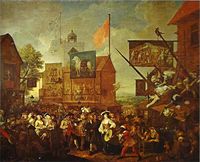Annotation:London is a Fine Town: Difference between revisions
No edit summary |
m (Text replacement - "garamond, serif" to "sans-serif") |
||
| (One intermediate revision by one other user not shown) | |||
| Line 1: | Line 1: | ||
=='''Back to [[{{BASEPAGENAME}}]]'''== | =='''Back to [[{{BASEPAGENAME}}]]'''== | ||
---- | ---- | ||
<p><font face=" | <p><font face="sans-serif" size="4"> | ||
'''(OH) LONDON IS A FINE TOWN.''' AKA and see "[[Watton Town's End]]," "[[Bonny Peggy Ramsey]]," "[[Our Polly is a sad slut]]." English, Air and Country Dance Tune (4/4 or 2/2 time). E Major (Chappell): F Major (Sharp). Standard tuning (fiddle). One part. The air appears in Henry Playford's '''Dancing Master''' (1665 and later editions), D'Urfey's '''Pills to Purge Melancholy''' (1707), and Gay's '''Beggar's Opera''' (1728), under various titles. The melody is somewhat older than these publications, however, as it is referenced as the accompanying tune for another song written on the occasion of James I.'s visit to Cambridge in 1614. Kidson (1922) confirms it was "an early and very popular air, set to a merry song." Other titles of songs to the air are "The Gowlin," a "Scotch" song from D'Urfey's play '''Trick for Treat''', in '''Pills to Purge Melancholy''' (vol. V, 1719), "Bonny Peggy Ramsey" in '''The Dancing Master''' (1707 & 1719), "The Cuckowes Comendation" ('''Pepys Collection'''), and "Our Polly is a sad slut" in Gay's '''Beggar's Opera''' (1728). | '''(OH) LONDON IS A FINE TOWN.''' AKA and see "[[Watton Town's End]]," "[[Bonny Peggy Ramsey]]," "[[Our Polly is a sad slut]]." English, Air and Country Dance Tune (4/4 or 2/2 time). E Major (Chappell): F Major (Sharp). Standard tuning (fiddle). One part. The air appears in Henry Playford's '''Dancing Master''' (1665 and later editions), D'Urfey's '''Pills to Purge Melancholy''' (1707), and Gay's '''Beggar's Opera''' (1728), under various titles. The melody is somewhat older than these publications, however, as it is referenced as the accompanying tune for another song written on the occasion of James I.'s visit to Cambridge in 1614. Kidson (1922) confirms it was "an early and very popular air, set to a merry song." Other titles of songs to the air are "The Gowlin," a "Scotch" song from D'Urfey's play '''Trick for Treat''', in '''Pills to Purge Melancholy''' (vol. V, 1719), "Bonny Peggy Ramsey" in '''The Dancing Master''' (1707 & 1719), "The Cuckowes Comendation" ('''Pepys Collection'''), and "Our Polly is a sad slut" in Gay's '''Beggar's Opera''' (1728). | ||
"Oh London is a fine town" is the first line in Thomas D'Urfey's comic 17-stanza song [http://digital.nls.uk/special-collections-of-printed-music/pageturner.cfm?id=87635025] (1719) and describes a citizens' outing to Greenwich. It mentions another old and popular tune. | |||
<blockquote> | </font></p> | ||
[[File:southwarkfair.jpg|200px|thumb|left|Southwark Fair. 1733, William Hogarth (1697–1764)]] | |||
<blockquote><font face="sans-serif" size="4"><i> | |||
''And when they come to Cuckolds-Point, they make a Gallant Show,''<br> | ''And when they come to Cuckolds-Point, they make a Gallant Show,''<br> | ||
''Their Wives bid the Musick play "Cuckolds-all-a-row".''<br> | ''Their Wives bid the Musick play "Cuckolds-all-a-row".''<br> | ||
</ | </i></font></blockquote> | ||
</font></ | <p><font face="sans-serif" size="4"> | ||
<p><font face=" | <br> | ||
''Source for notated version'': | ''Source for notated version'': | ||
<br> | <br> | ||
<br> | <br> | ||
</font></p> | </font></p> | ||
<p><font face=" | <p><font face="sans-serif" size="4"> | ||
''Printed sources'': Chappell ('''Popular Music of the Olden Time''') | ''Printed sources'': | ||
Chappell ('''Popular Music of the Olden Time, vol. 2'''), 1859; pp. 6–7. | |||
D'Urfey ('''Pills to Purge Melancholy, vol. 4'''), 1719; p. 40. | |||
Sharp ('''Country Dance Tunes'''), 1994; p. 26. | |||
<br> | <br> | ||
<br> | <br> | ||
</font></p> | </font></p> | ||
<p><font face=" | <p><font face="sans-serif" size="4"> | ||
''Recorded sources'': <font color=teal></font> | ''Recorded sources'': <font color=teal></font> | ||
</font></p> | </font></p> | ||
<br> | <br> | ||
<br> | <br style="clear:both"/> | ||
---- | ---- | ||
=='''Back to [[{{BASEPAGENAME}}]]'''== | =='''Back to [[{{BASEPAGENAME}}]]'''== | ||
Latest revision as of 14:16, 6 May 2019
Back to London is a Fine Town
(OH) LONDON IS A FINE TOWN. AKA and see "Watton Town's End," "Bonny Peggy Ramsey," "Our Polly is a sad slut." English, Air and Country Dance Tune (4/4 or 2/2 time). E Major (Chappell): F Major (Sharp). Standard tuning (fiddle). One part. The air appears in Henry Playford's Dancing Master (1665 and later editions), D'Urfey's Pills to Purge Melancholy (1707), and Gay's Beggar's Opera (1728), under various titles. The melody is somewhat older than these publications, however, as it is referenced as the accompanying tune for another song written on the occasion of James I.'s visit to Cambridge in 1614. Kidson (1922) confirms it was "an early and very popular air, set to a merry song." Other titles of songs to the air are "The Gowlin," a "Scotch" song from D'Urfey's play Trick for Treat, in Pills to Purge Melancholy (vol. V, 1719), "Bonny Peggy Ramsey" in The Dancing Master (1707 & 1719), "The Cuckowes Comendation" (Pepys Collection), and "Our Polly is a sad slut" in Gay's Beggar's Opera (1728). "Oh London is a fine town" is the first line in Thomas D'Urfey's comic 17-stanza song [1] (1719) and describes a citizens' outing to Greenwich. It mentions another old and popular tune.

And when they come to Cuckolds-Point, they make a Gallant Show,
Their Wives bid the Musick play "Cuckolds-all-a-row".
Source for notated version:
Printed sources:
Chappell (Popular Music of the Olden Time, vol. 2), 1859; pp. 6–7.
D'Urfey (Pills to Purge Melancholy, vol. 4), 1719; p. 40.
Sharp (Country Dance Tunes), 1994; p. 26.
Recorded sources:
